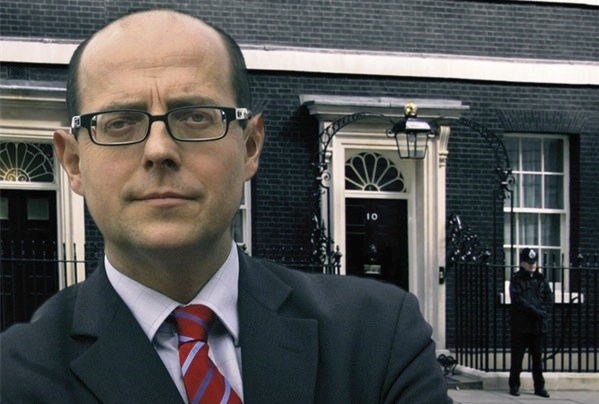I am standing in the courtyard of HMP Wormwood Scrubs with the Prime Minister. He’s there, or so I read, to convince the papers that his approach to law and order has moved from ‘hug a hoodie’ to ‘mug a hoodie’. I’m there to ask him not just about that but about why he let his Chief Whip stumble along wounded for so long; and to put to him suggestions from his own party that he and his ministers look, well, less than competent. Having batted away my questions with painful ease, the PM delivers a final blow as we film a couple of editing shots. With a mischievous smile he tells me he resisted the temptation to raise the subject of an organisation really facing a crisis. Ouch. These are not the easiest of days to be working at the BBC.
Being at the eye of a media storm should teach any journalist to pause and think when next tempted to deride this or that government department or G4S or, dare I say, News International, for their failure to ‘get a grip’. Having said that, only in the BBC would the full resources of the organisation — an hour of evening TV plus the power of the press office — be given to one group of journalists to say that their bosses had cocked up. I suggested to the PM that he might allow members of his Cabinet the same licence to analyse each other’s faults. The reason I can still smile during this crisis in the corporation is that nothing I have seen suggests that Auntie is guilty of either of the charges that really matter: knowingly covering up sexual abuse or halting a journalistic inquiry to put out a tribute programme to a cheesy and sleazy celebrity. That is, as prime ministers in trouble like to say, the big picture.
The launch party for my new book was timed to come just hours after the director-general’s grilling by MPs. I had to warn colleagues supping on Westminster’s best cheap warm white wine that there were — whisper who dare — journalists listening in. My publishers have every reason to feel bitter about this diary clash since I moved the publication date in order ‘to avoid embarrassing the DG in his first few weeks in the job’. As it happens, George Entwistle may find my account of the BBC’s battles with governments over the decades rather reassuring bedtime reading. So far, at least, no politician has tried to pay him £100 to make a broadcast (as Churchill did when Reith kept him off the air) nor has any prime minister threatened to seize control of the organisation (as Eden did during Suez) or demanded the timing of a sitcom be changed so that Labour voters wouldn’t stay at home (as Wilson did when Steptoe & Son was on an hour before polls closed) or refused to give an interview for almost a year (as Margaret Thatcher did even when ITV was on strike in 1979). Perhaps George Entwistle can now look forward to those sort of crises.
Writing about the past fuelled my political nostalgia, but this week I was able to wallow in it when watching the National Theatre’s This House. It’s a political drama set in the engine rooms of the Commons — the offices of the whips. The play’s set in the mid-1970s when politics became a matter of life and death. With the Labour government having no majority and the Tories refusing to co-operate, votes were won or lost by one, frequently gravely ill MP being ferried in by ambulance. More members died during this period of political trench warfare than at any time before or since. At times hilarious, at others moving, This House was a reminder that political passion can be combined with respect for and even an honouring of your opponents. The tiny Cottesloe theatre was turned into a miniature Commons with the audience sitting on replica green benches. I bumped into a former Labour minister sitting on the government benches. How real was it, I asked. His only complaint was that the benches were more than two swords’ widths apart.
Andrew Mitchell will, no doubt, be musing on the joys of life in the whips’ office which he will now miss. On the day he resigned some BBC viewers were upset that I suggested that he was the victim not just of his own behaviour and a Labour campaign but of the Police Federation. I chat to the police officers who man the gates of Downing Street and the entrances of the Commons most days and know what good, likeable and upstanding individuals they are. I also know that their (non) union is to be feared. A few months back I reported on police perks — double time on a Sunday and the like — that a government report proposed to cut. I made an error which I immediately corrected on my blog — confusing the generous terms of some Metropolitan Police civilians with the slightly less generous terms of the boys and girls in blue. For weeks afterwards I was greeted at every pass check and security scan by the same friendly, if slightly menacing, inquiry: ‘Got your facts right now have you, sir?’ This week I’ve firmly resisted the temptation to ask my bosses the same question.






Comments